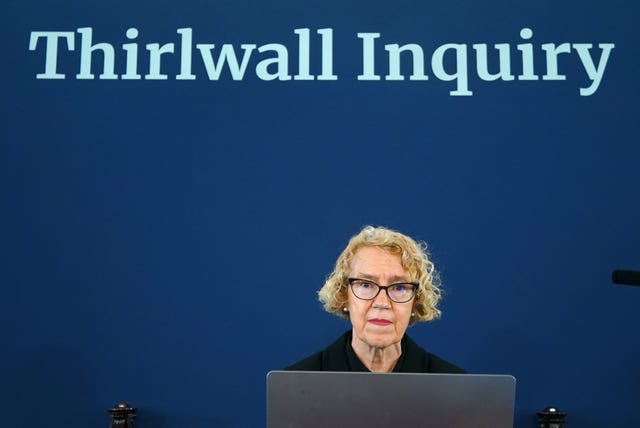Medic says Letby ‘misled and maybe manipulated’ him into giving her information
The public inquiry heard he swapped 1,355 Facebook messages with the nurse in a three-month period when they worked together.

A medic has told the Lucy Letby public inquiry that the serial child killer nurse “misled and maybe manipulated” him into giving her information about babies she had attacked.
The then-junior doctor at the Countess of Chester Hospital swapped 1,355 Facebook messages with Letby in a three-month period when they worked together between June 2016 and September 2016, the inquiry heard.
The Thirlwall Inquiry into the events surrounding Letby’s crimes heard the registrar frequently “reassured” Letby in messages over her care of three infants in June 2016 – a boy she attempted to murder and two brothers from a set of triplets who she murdered.
He went on to support her grievance case against her removal from the neonatal unit to non-patient duties from July 2016 and also set up a number of “observational visits” to Liverpool’s Alder Hey Children’s Hospital the following year when he worked there as a locum consultant, the inquiry heard.
Asked by counsel to the inquiry Rachel Langdale KC to explain the Facebook messages, the doctor, who cannot be identified for legal reasons, replied: “Letby was struggling with her mental health and I think I picked up on that and offered some support, and that support it grew, and I understood that she slept very, very poorly because of worry and anxiety.
“There were often messages that were passed throughout the day and sometimes later at night and early in the morning.”
One such message was Letby inquiring about the condition of Child N, an infant she attempted to murder in early June 2016, and querying with the medic, referred to as Dr U, whether she had done anything wrong.
The inquiry heard Dr U messaged back: “Oh Lucy, poor little thing. I am sure he has had the best care possible and you will have done everything you could for him.”
Miss Langdale said: “Do you think it was appropriate to be messaging about Child N with her at this time?”
Dr U said: “In hindsight, no. Looking at the content of the messaging here, I have shared too much. It is common to give updates and how patients are without naming them or giving lots of clinical detail.
“I gave details at the time that I thought were helpful but I see now that was probably not the case.”

Following the deaths of Child O and P later that month, Letby messaged the doctor “do I need to be worried?” following questions that a consultant was asking about the triplets’ care.
Dr U told the inquiry: “I didn’t know exactly what she was worried about but I think having looked after the two babies on consecutive days she was concerned that she would be thought to be responsible for the deaths and as I didn’t know of the number of preceding deaths it was a ‘reassuring no’.”
Miss Langdale said: “Well she was worried if people were asking questions about it, wasn’t she?”
Dr U said: “In hindsight, yes obviously.”
Miss Langdale said: “And at the time you mistook that for what?”
Dr U said: “Anxiety.”
Miss Langdale asked Dr U why he forwarded Letby an email from neonatal lead Dr Stephen Brearey in which he indicated Child O and P’s deaths would be investigated at inquests.
Dr U replied: “It was because of the worry about those two babies. They were unexpected deaths. She gave me the impression she was very upset… I was basically trying to give her some insight into what was going on.”
Miss Langdale said: “Why was it for you for tell her?”
Dr U said: “Again in hindsight, that was an error on my part. I should not have sent it.”

He added that, in hindsight, the messages looked more of “panic about the events that had taken place and her role in them”.
Miss Langdale said: “And needing information from you about babies and how they might have died?”
Dr U said: “It felt like a supportive gesture. That now feels like a mistake. It is something I have considered on a daily basis for the last six to eight years.”
He went on: “I think I have become aware that I was not aware of the full clinical picture and I provided support by being misled and maybe manipulated, and for that I’m really sorry that things have come to an end as they have.
“I have a lot of regrets over how that period of time took place.”
Dr U told the inquiry he did not suspect deliberate harm had been caused to Child O and P.
He said he attended a mortality review meeting which followed on July 5 2016 but was only present for the beginning and he “presumed” that references to Letby’s presence and her potential involvement with the numerous deaths and collapses took place after he left.
The inquiry heard that Dr U emailed bosses at Alder Hey in December 2016 to say Letby had an interest in care of post-operative babies to “facilitate her personal development” and also to observe some theatre sessions.
Dr U said he was told it was approved by whoever was managing Letby at the Countess of Chester on the basis that she must be supervised at all times and have no direct patient contact.
Lady Justice Thirlwall was told that Alder Hey had ascertained through its records that Letby went on to attend a multi-disciplinary team meeting in March 2017 and also may have attended an outpatient clinic with Dr U in the same month and a “roadshow meeting” relating to insulin pumps in April 2017.
Cheshire Police were called in by the Countess of Chester in May 2017 to investigate the increased mortality rate and Letby continued working at the hospital until her arrest in July 2018.
Letby, 34, from Hereford, is serving 15 whole-life orders after she was convicted at Manchester Crown Court of murdering seven infants and attempting to murder seven others, with two attempts on one of her victims, between June 2015 and June 2016.
During her trial Letby denied she was in love with Dr U and said they were “just friends”.
The inquiry is expected to sit at Liverpool Town Hall until early next year, with findings published by late autumn 2025.





